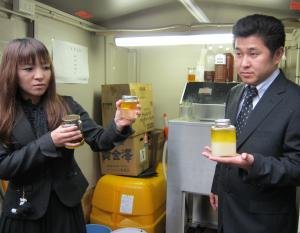By Randy Martin | Director for Partnership Development, East Asia
If you had never visited Japan’s tsunami-ravaged coast until now, the bleak landscape where homes and businesses once stood would be sobering.
Having watched the relief effort and the recovery, my visits back to the Tohoku region have been increasingly reassuring. In fact, my recent visit with partner colleagues was inspiring. We were there to witness the signs of recovery – and we found many. Thank you for your donation to make these improvements possible!
At a recent event organized by Kesennuma Shinkin, a local cooperative bank we’re partnering with to support small business recovery, 13 entrepreneurs were awarded grants. The recipients from Kesennuma and three neighboring coastal towns have used the funds to start new businesses in the disaster area. Their businesses run the gamut — from a day care center, a fish processor and a baker to a machine repair shop, a mulberry tea producer and an ice-making factory.
In only five months since its inauguration, this Mercy Corps program has funded the startup of 20 new businesses (like the three featured in this video) and supported the recovery of an additional 50 businesses through a loan subsidy program. Well over 300 jobs have been created in the process.
But the program does more than restore jobs — it recreates livelihoods and self-determination. Each of the entrepreneurs has an incredible story to tell and an important contribution to make.
Like Tomohiro Kashiwagi, whose repair shop was completely destroyed by the tsunami. Without a building or the capital to buy or build one, he and his wife, Akiko, are starting from the ground up with a completely new — and very innovative — business in their home. They are recycling cooking oil into fuel.
Kashiwagi has lined up a string of restaurants as a source of used cooking oil. He collects it and refines it using a machine that he bought with his grant. He then sells the fuel for use in converted diesel engines. It’s not only good for the couple — and good for the environment — it’s good for customers, as it sells for about 30% less than commercial diesel fuel. The city of Kesennuma, in fact, is Kashiwagi’s primary customer, having converted some of its garbage trucks to run on his recycled vegetable oil. He says they smell like fried chicken when they drive by!
It was a very moving day. Because of your support, the lives of hardworking entrepreneurs, their families and their community ar being transformed. Thank you.
Links:
Project reports on GlobalGiving are posted directly to globalgiving.org by Project Leaders as they are completed, generally every 3-4 months. To protect the integrity of these documents, GlobalGiving does not alter them; therefore you may find some language or formatting issues.
If you donate to this project or have donated to this project, you can recieve an email when this project posts a report. You can also subscribe for reports without donating.
